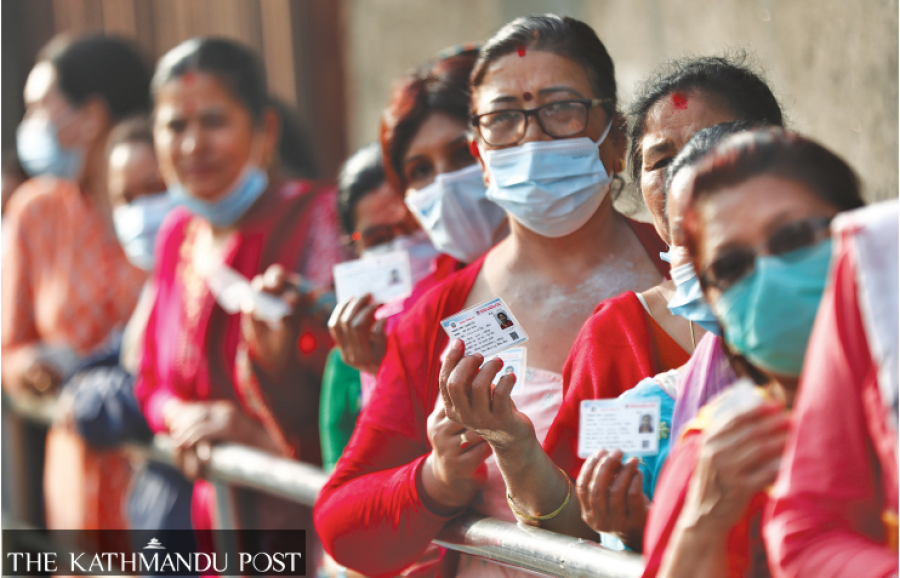Politics
More than 40 percent local election candidates yet to submit spending details
There were a total of 145,011 candidates. Poll law requires them to furnish the details within 30 days of election. The Election Commission mulls action.
Tika R Pradhan
It has been almost three months since the local elections, but more than 40 percent of the local election candidates, in breach of the law, have not furnished their election expenditure details to the Election Commission. As per the Election Commission Act, candidates are required to furnish such details within 30 days of the elections.
As many as 145,011 candidates representing 65 parties and independents were in the fray for the May 13 local polls, and 390 of them were elected unopposed.
With around half of the candidates flouting the election law, according to observers, the Election Commission seems to have failed in its bid to control the election expenses.
The law says the candidates must furnish their expenditure details within 30 days of the publication of election results and failure to do so can lead to even cancellation of their election as local officials.
“We don’t have complete data on election expenses yet as we are collecting details from districts. But the response from the candidates has remained poor,” said Surya Prasad Aryal, information officer at the Election Commission. “As per our preliminary estimates, only around 45-50 percent of candidates have submitted their expenditure details.”
Other officials at the Election Commission said more than 40 percent of the candidates have not submitted their expense details yet.
The commission allows candidates for mayor and deputy mayor to spend a maximum of Rs750,000 in case of metropolitan cities, Rs550,000 for sub-metropolitan cities, and Rs450,000 for municipalities. And the expenditure limit for candidates for chiefs and deputies of rural municipalities is Rs350,000. For ward chair and member candidates, the poll body has set Rs300,000 as maximum expenditure limit for metropolitan cities, Rs250,000 for sub-metropolitan cities, Rs200,000 for municipalities and Rs150,000 for rural municipalities.
For 753 local levels 35,221 people’s representatives were elected including 293 mayors, 293 deputy mayors, 460 chiefs and as many deputy chiefs, 6,743 ward chairs, as many woman ward members and Dalit woman ward members and 13,486 ward members from the open category.
Except for the Budhi Ganga Municipality, all the results of the local polls were out by May 24. At Budhiganga elections were held on July 7 and results were declared on July 10.
Clause 25 of the Election Commission Act, states that the political parties or the candidates contesting the polls are required to submit details of their election expenses to the office designated by the polls body in specified format within 30days of the publication of the final election results. And the Election Commission has designated District Election Offices or the Regional Election Officers to receive the details of the expenses.
In the past also, candidates used to take several months to present their expense details.
“The trend of flouting the election laws is serious,” said Dinesh Thapaliya, chief election commissioner. “You will soon get to know the biggest action taken against the flouting candidates ever. We are working on it.”
The Election Commission, according to Thapaliya, is preparing to hold two different press conferences to inform the public about the details of the May 13 local polls including the details of the candidates campaign expenses.
As per the Election Commission Act, any party or candidate that fails to summit expenditure details is subjected to a fine equivalent to his or her expenditure or Rs500,000, whichever is more.
According to officials at the Election Commission, they had taken action against some candidates for failing to submit expense details in 2017. “Yes we had taken action against a few candidates,” said Yagya Bhattarai, chief of the legal department of the Election Commission, although he could not say how many candidates faced action.
The commission can also bar such candidates from participating in any elections for up to six years.
Election experts and observers said the trend of flouting the Election law is not new.
“Actually the expenditure cap was introduced to tame election spending and to ensure fair competition, but most parties and candidates have been flouting it,” said Ayodhee Prasad Yadav, former chief election commissioner.
Earlier this year ahead of the local elections, during a meeting called by the Election Commission to announce the ceiling for electoral spending, representatives of some parties had asked the commission to fix the spending limit at Rs70 million for mayoral candidates of metropolitan cities arguing that such candidates spend around Rs100 million on average.
Observers say the reluctance of the commission to punish candidates who publicly claimed to have flouted the spending limits has encouraged others to ignore the election law.




 17.12°C Kathmandu
17.12°C Kathmandu















